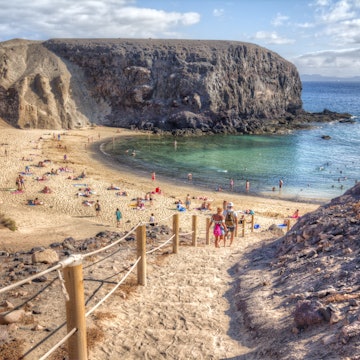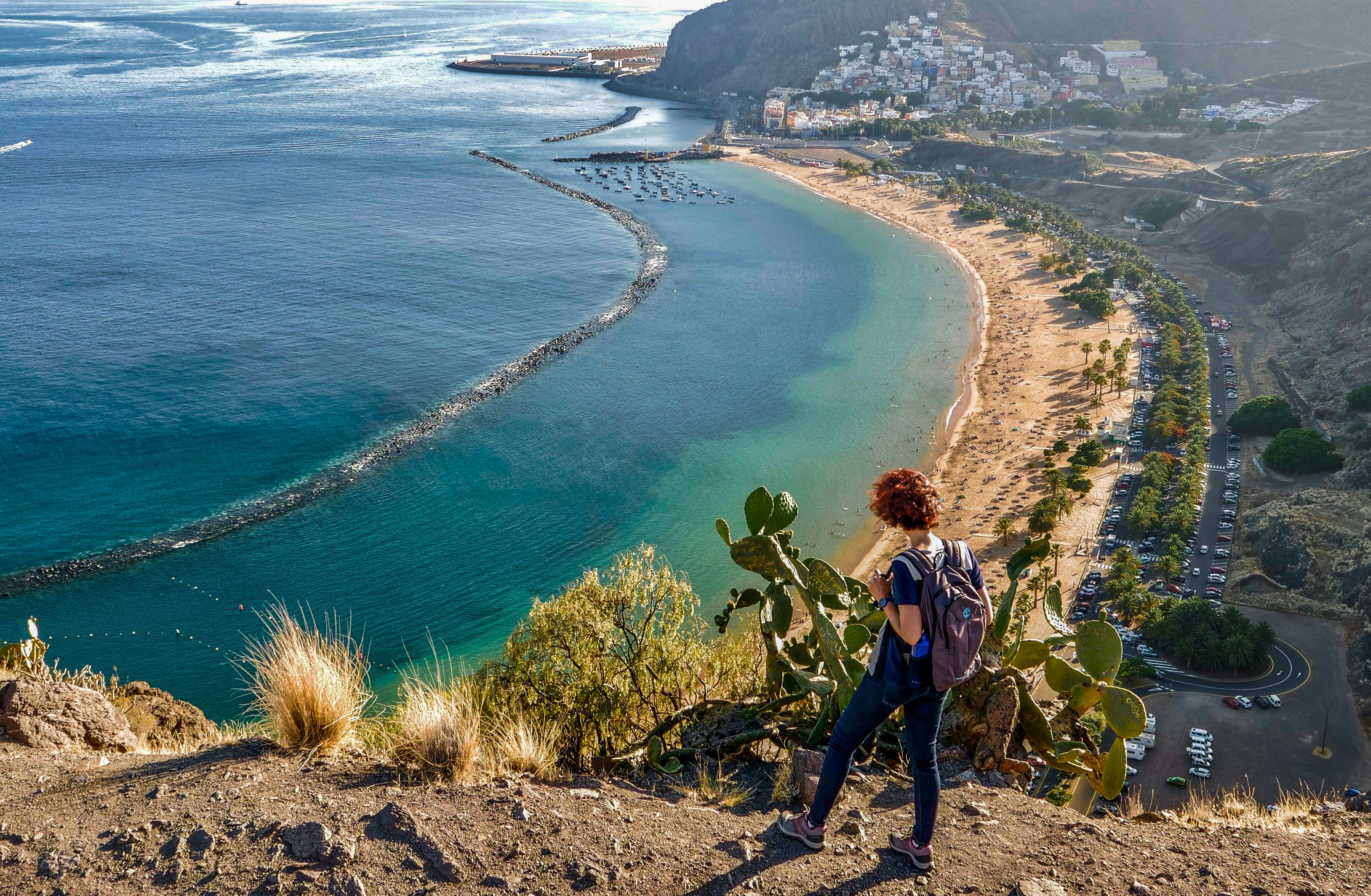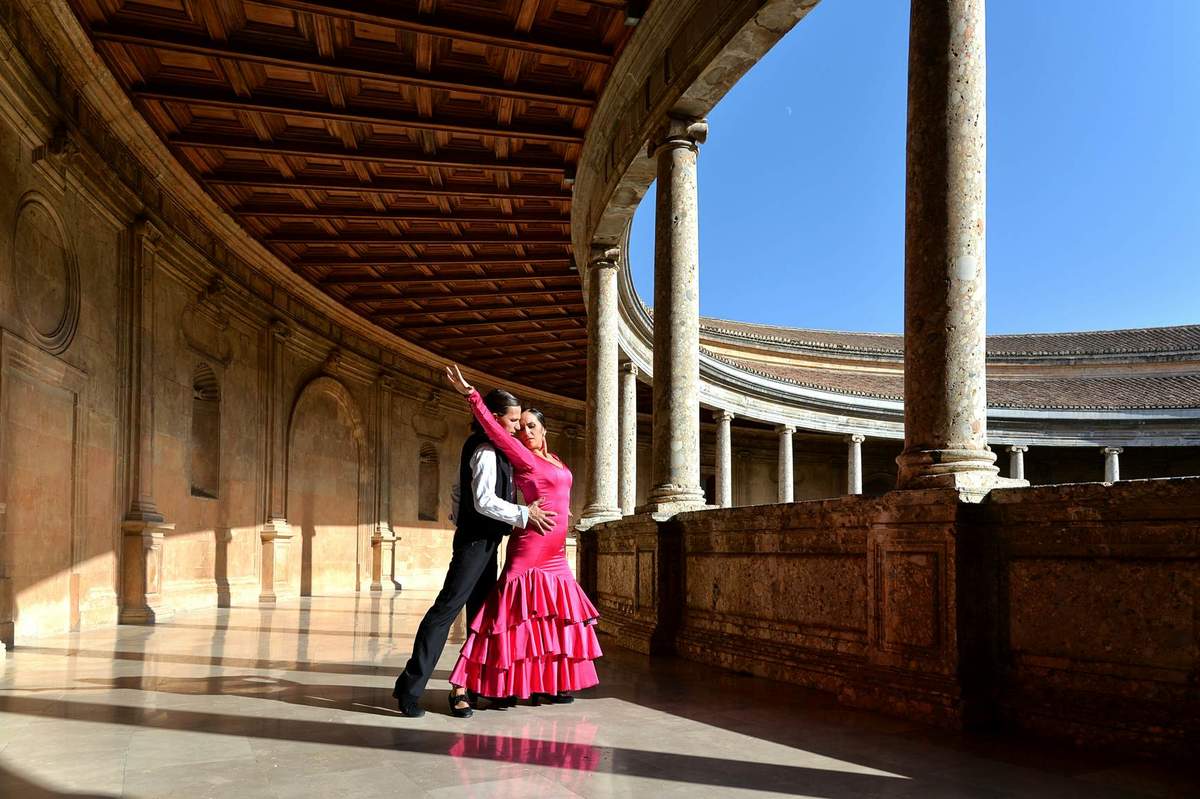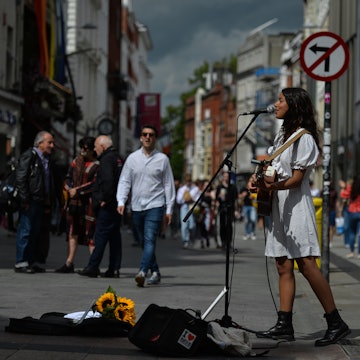
The best free things to do in Tenerife, from beach days to star-spangled nights

Jul 18, 2022 • 8 min read

Tenerife has plenty of ways to have fun in the sun for free © simonapilolla / Getty Images
You might not believe it when looking at the ritzy resorts on the island’s south coast, but the best things in Tenerife really are free, whether it’s nature, culture or history that rocks your traveler boat.
You can climb volcanoes, swim in lava pools, stargaze in some of Europe’s most spectacularly dark skies, explore alley-woven historic towns studded with colonial mansions, wander subtropical gardens full of rare beauty and birdsong, chill on blonde Saharan sands, contemplate cutting-edge architecture, get into the carnival groove, camp in off-the-radar forest reserves – take your pick!
You name it, the chances are you can do it in Tenerife and it won’t cost you a single cent. Here's our pick of the top free things to do in Tenerife, for the perfect Canary Islands trip on a budget.
Stargaze in Parque Nacional del Teide
It’s not just the daytime that has an otherworldly feel in Parque Nacional del Teide, where all eyes are on the 3718m (12,198ft) Pico del Teide volcano. Spain’s highest peak punches above a crater-blasted, rust-red lunar landscape, and on clear, moonless nights, the national park has hands-down some of the best stargazing in the northern hemisphere.
Observatorio del Teide attracts astronomers from all over the world. From December to March, hook onto one of the free tours (check the website for dates) to get the chance to peer through one of the giant telescopes that open up the wonders of the universe.
Year-round, you can see plenty with just a simple pair of binoculars: meteor showers, the Milky Way and 83 of the 88 officially recognized constellations. The blanket of glittering stars is impressive even when observed with the naked eye.
Get a splash of Canarian life in Garachico
Handsome, history-rammed Garachico on Tenerife’s rugged north coast is a true survivor. The town has been blighted by fire, flood, freak storms and a massive volcanic eruption over the centuries and lived to tell the tale. Its historic center is a beauty, especially Plaza Libertad, shaded by lofty palms and Indian laurel trees, where you can get a flavor of the Canaries beyond the tourist crowds, watching locals gather over dominoes at cafes and kids play.
For a cool-off with a twist, head down to El Caletón, where you can paddle and swim in natural pools shaped by the lava flow from the 1706 volcanic eruption.

Admire the dragon tree in Icod de los Vinos
If you make it as far as Icod de los Vinos in the island’s north, it’s most likely because you’re eager to glimpse the town’s famous drago (dragon) tree. Shaped like an umbrella, it is thought to be the oldest and largest of its kind in the world. Some say it’s been standing here for 1000 years, but truth be told, it’s probably a few centuries younger. Regardless, this gnarled wonder is one very ancient and special tree.
Skip Drago Park, where you have to pay to see the tree, and instead admire it for nada from the lovely vantage point of Plaza Andrés de Lorenzo Cáceres, the town’s elegant 16th-century square.
Go for a morning market mosey
Buzzing with activity from the crack of dawn, Tenerife’s markets offer a fabulous and free taste of island life (as well as plenty of picnic inspiration). Top billing goes to the architecturally striking, neo-Islamic Mercado de Nuestra Señora de África, with arches and patios that are a nod to nearby Morocco.
Its stalls heave with ripe tropical fruits, fresh fish, local wine, goat’s cheese, mojo (spicy salsa) bread, honey and herbs. La Laguna’s Mercado Municipal is also worth a look. Some stalls will also let you taste products for free.
Plan a forest barbecue
Long before forest bathing became a thing, tinerfeños (Tenerife islanders) were flocking to the island's áreas recreativas at weekends to spend quality time with friends and family among forests of fragrant Canarian pine. Dotted all over the island – often in the most scenic places – these tree-shaded spots are brilliant for an alfresco lunch, with stone barbecue areas and picnic tables that are free for all to use, as well as a heady shot of nature.

Relax on Saharan sands at Playa Las Teresitas
It costs nothing to crash on the beach, dig your toes deep into glimmering volcanic sands and watch the Atlantic waves roll in. There’s some seriously stiff competition when it comes to Tenerife’s best beaches, but one you won’t forget in a hurry is Playa de las Teresitas, a gorgeous mile-long scoop of honey-colored sand, with palms, sapphire-blue seas and the Anaga Mountains as a backdrop.
The flour-soft sands here were imported from the Sahara, and at weekends, the beach thrums with locals hanging out at the chiringuitos (beach bars) over cocktails, seafood and salsa beats. There are epic views over the sands from the mirador on the ridge at the east end of the beach.
Enjoy a fine arts fix at Museo de Bellas Artes
Lodged in a spectacular neoclassical, cotton-candy-pink building, Santa Cruz de Tenerife’s Museo de Bellas Artes wings you through 14 exhibition rooms of paintings from the 16th to the 20th centuries. Spanish, Canarian and Flemish paintings feature highly, with masterpieces of the Ribera, Bruegel and Sorolla ilk, as well as some hard-hitting battle scenes by Manuel Villegas Brieva. That Tenerife has such an impressive museum is a wonder, and the fact that it is free even more so.
Go wilderness camping in a forest reserve
Want to go camping but don’t want to pay for a pitch? While spontaneous wild camping is off-limits in Tenerife, the island has a sprinkling of free forest campsites, many hidden under the shade of lofty pines in remote beauty spots far from the crowds. You’ll need a permit (so book far in advance), but these back-to-nature sleeps are really something. Often you’ll be alone with only the stars and hooting, rustling wildlife for company.

Feel the Atlantic force at Punta de Teno
As far west as you can go without dropping into the surf-smashed Atlantic, lighthouse-topped Punta de Teno has an edge-of-the-world quality about it. The volcanic headland is thrillingly wild, with sheer cliffs nose-diving into the wave-whipped, brilliant blue ocean and mountains rearing up beyond. Take it all in from the black volcanic beach, where you can swim, swoon over views reaching along the west coast to the giant cliffs of Los Gigantes and linger for a fiery sunset. It’s one of the best free shows on the island.
Get a historic high in La Laguna
La Laguna is often billed as Tenerife’s most beautiful town, and you can believe the hype – it’s a historic knockout. The capital until 1723, this Unesco World Heritage-listed town is a marvelous time capsule, and its streets are brimming with 16th- to 18th-century mansions painted in punchy pastels, some festooned with ornate wooden balconies. So lovely is the town, in fact, that it provided the model for many colonial towns in the Americas.
Going for a wander here is a joy. Calle San Agustín presents a lineup of the town’s most photogenic mansions, some centered around tree-shaded courtyards. While you’re here, stop by the Museo de la Historia de Tenerife, a glorious 16th-century mansion spelling out the island’s past in artifacts, from Guanche pottery to vintage carriages. Visit after 2pm on Friday and Saturday and it’s free.
Throw yourself into the carnival spirit
The samba rhythms, sequins and smiles of Santa Cruz de Tenerife’s carnival in February show off the island at its fiesta-loving best. Second only to the carnival in Rio de Janeiro, this is a riotous round-the-clock feast of music, fancy dress (and cross dress) and fun. Most of the wild street parties and events are free, but you’ll need to get in quick with booking your accommodations.
For a little taste of carnival year-round, visit the free Casa del Carnaval, where you can check out the dazzling, feather-bedecked costumes. Some are so exuberant and heavy, it’s a wonder anyone can wear them, let alone dance in them for hours.

Eye up architecture at Tenerife Espacio de las Artes (TEA)
Bearing the avant-garde hallmark of Pritzker Architecture Prize-winning Swiss architects Herzog and de Meuron, the angular, dark concrete Tenerife Espacio de las Artes (TEA) is patterned with 1200 randomly shaped glass openings. It's visually stunning, especially after dark when it glimmers like a filigree lantern by the waterfront.
Though exhibitions in the galleries are ticketed, it’s free to take a peek inside the building – and you really should. Be sure to drop into the extraordinary downstairs library, a sharply contemporary space for browsing and reading.
Become a birdwatcher at Parque Natural de la Corona Forestal
Wrapping its green arms around the island, the 466-sq-km (180-sq-mile) Parque Natural de la Corona Forestal is an enchanting woody wonderland of Canarian pine and laurisilva (laurel) forests, ravines and volcanic slopes, crisscrossed by some terrific hiking trails, among them the long-distance GR131. King of the trees is Pino Gordo (the “Fat Pine”), a huge and magnificent Canarian pine tree towering 45m (148ft) high, with a girth of 9.8m (32ft).
It is free to walk in silent wonder here, and bringing binoculars ups your chances of spotting birdlife, from woodpeckers to sparrow hawks, kestrels, Tenerife blue chaffinches, Canarian warblers, and Bolle's and laurel pigeons.
Make the pilgrimage to Candelaria
In 1392, a statue of the Virgin holding a candlestick washed up on a beach and was discovered by two indigenous Guanche goatherds. The effigy gave the quaint fishing village of Candelaria on Tenerife’s east coast sacred status, and its name.
Pilgrims have been flocking here ever since to glimpse the wooden statue of the Virgin of Candelaria, or the Black Madonna, patron saint of the Canary Islands, in the resplendent domed Basílica de Nuestra Señora de Candelaria. Built in lavish neoclassical style and gazing out to sea, the basilica is younger than it looks. The current structure dates to 1959, but its history reaches back much further, and the richly ornamented interior (especially the polychrome cupola) is magnificent.
The village springs to life for the festival of the virgin in mid-August, with flower displays, fiestas, folk groups and pilgrims.














